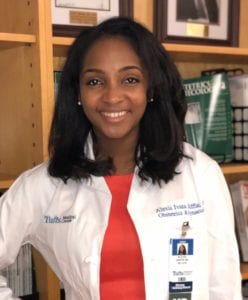Changing the Face of Gynecologic Oncology | Alexis Griffin, MD

Alexis Griffin, MD
A few months ago, my phone rang. Upon answering the phone, I was delighted to hear the voice of a family friend. “How are you, Dr. Griffin?” She went on to tell me that she recently reviewed her test results with her doctor, and she wanted a second opinion. The results read, “low grade endometrioid adenocarcinoma.” “What does that mean? The doctor told me that I need to have surgery. What do you think?” she asked. I, a second year OB/GYN resident, took a deep breath, and for the first time in my career I uttered those chilling three words, “you have cancer.” We went on to discuss the importance of early detection and surgical intervention.
Of the 12,100 oncologists practicing in the United States, only 2.3% identify as Black or African American.1 Having a diverse workforce contributes to the successful delivery of culturally competent care and naturally fosters trust1. How can diversity be increased within the field of gynecologic oncology? One way to increase diversity is through mentorship. Interestingly, one study found that among OB/GYN residents in the United States, individuals who applied for gynecologic oncology fellowship were more likely to train in academic programs, have a mentor in the field, and cite mentorship as a reason for subspecialty choice.2 This offers an incredible opportunity for current gynecologic oncology providers to make a personal difference in the direction of the field.
Gynecologic oncology is well known to be a rigorous and challenging sub-specialty. Potential applicants may feel that they must be the “perfect candidate” to enter into this field (i.e., have the highest CREOG scores, multiple publications, extensive research and surgical experience in gyn onc, and outstanding recommendations). Furthermore, residents who lack early exposure to gynecologic oncology may find it more difficult to build a competitive application, and ultimately match. As a result, for many, becoming a gynecologic oncologist may seem like an unobtainable goal. This sentiment may be especially true for OB/GYN residents whose racial and/or ethnic backgrounds are underrepresented in medicine.
In the US, egregious stereotypes about race/ethnicity and skin color still plague the medical system. Racism, manifested as implicit or explicit bias, still sadly links brown skin with inferiority, lack of intellect, and blunted potential. Despite this all-too-common narrative, my experience has been altered by strong mentorship. My mentor, John Schorge, MD, a well-respected gynecologic oncologist and Chief of Gynecologic Oncology at Tufts University School of Medicine, recognized my potential. During my intern year, he became one of my mentors and encouraged me to consider a career in gynecologic oncology. He reinforced the idea that I was good enough to seek acceptance into this prestigious sub-specialty; he offered guidance about which societies to join, research topics to explore, and grant opportunities to pursue. While the lack of diverse representation can be discouraging, having the proper guidance and sponsorship from mentors can truly bring about change.
All in all, diversity can be increased in Gynecologic Oncology; however, it will take the commitment, leadership, and diligence of physicians in the field. Are there residents within your program who come from underrepresented racial/ethnic backgrounds, or non-traditional backgrounds, that don’t fit the “traditional” mold of residents who pursue gynecologic oncology? Consider acknowledging their potential and cultivating mentorships. In the words of Oprah Winfrey, “a mentor is someone who allows you to see the hope inside yourself3.” Be that lens for the next generation of gynecologic oncologists, as our patients depend upon it.
Alexis Griffin, MD, is a postgraduate year two (PGY II) in the Department of Obstetrics and Gynecology at Tufts Medical Center in Boston, MA.
This column is sponsored by an unrestricted grant from GSK. Sponsorship excludes editorial input. Content developed by the SGO Diversity, Inclusion & Health Equity Committee.
CITATIONS
- American Society of Clinical Oncology. (2021, February 05). Facts & FIGURES: Diversity in oncology. Retrieved February 24, 2021.
- Palisoul, M., Greenwade, M., Massad, L., Hagemann, A., Powell, M., Mutch, D., . . . Kuroki, L. (2019, October 24). Factors influencing residents’ interest in gynecologic oncology fellowship. Retrieved March 11, 2021.
- The Acquisition Group. (2019, November 01). Ten inspiring quotes on mentorship. Retrieved February 24, 2021.
Diversity, Inclusion & Health Equity Speed Mentoring Session
SGO 2021 Virtual Annual Meeting on Women’s Cancer
Friday, March 19, 2021
1:00 p.m. – 2:15 p.m. CT
The Diversity, Inclusion & Health Equity (DI&HE) Committee has reimagined the in-person speed mentoring experience for the virtual world. During this 75-minute session, attendees will meet multiple mentors and fellow gynecologic oncology health care professionals, and hear from mentors on three different topics selected to help you navigate your career path: becoming a leader; negotiating a new job or promotion; and maintaining work-life balance. Participants can ask questions and make connections for long-term mentorship. While open to everyone, this session is ideal for fellows, early to mid-career gynecologic oncology health care professionals or those changing careers.